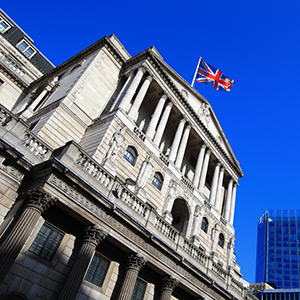Bank of England interest rates hike – what does it mean for real estate?

The Bank of England’s Monetary Policy Committee (MPC) last week hiked interest rates by 50 bps and surprised the financial markets by forecasting a five-quarter recession for the UK. The Bank added that there is a high degree of uncertainty surrounding its forecasts, given the situation in Ukraine and volatile energy markets. High energy prices have already taken a heavy toll on UK consumers’ ability to spend, with another hike in the energy cap approaching this autumn. The MPC is suggesting any easing of supply will see pricing move quickly, with other parts of the economy moving quickly too.
If the Bank’s forecast is realised, a recession will mean corrections for pricing for commercial property. However, real estate markets are not moving into this downturn with the kind of excesses that had built up in 2007. Use of debt has been more restrained, with loan-to-value ratios at around 60% for prime. We doubt that yields will soften dramatically, as the vast majority of property firms and funds today are well capitalised, so are unlikely to be pushed into forced sales.
The extent of the impact of a downturn will vary across the property sectors. Most retailers expect sales to come under pressure in the second half of the year, although it is worth noting that many retailers are in a better position than a few years ago, thanks to lower rental overheads and additional market share due to the failure of competitors. Nevertheless, weaker retailers are likely to find the remainder of 2022 and 2023 difficult, which will have a knock-on effect on retail property. There will also be concerns about covenant strength in areas like hospitality, where firms are still rebuilding their balance sheets after Covid.
Another trend we are starting to see is vendors deciding to hold the asset rather than selling into a soft market. The volatility for prices and economic uncertainty hinted at by the MPC adds to the logic for investors to hold not sell.
We are anticipating a big spread to emerge between ESG-proofed assets and those that do not meet immediate and future requirements – a distinct flight to quality. Also, the fall in value for the pound has started to draw in overseas buyers, and we expect this to continue. Further down the line, and once price correction has occurred, we would expect cash-rich long-term investors to begin making opportunistic purchases. Once the correction is widely believed to be priced in, buyers will move to acquire assets they can reposition to reach their required return criteria, bringing some needed core product to the market.
Recent months have seen demand cool for development sites and assets that require extensive refurbishment, due to high construction costs. While a recession will exacerbate that trend, the resulting drop off in speculative development will act as a stabiliser for leasing markets by reducing future supply.
It should also be remembered that the Bank of England’s forecast is based on the assumption that current government policy will continue on its present course. However, a new Prime Minister will enter Downing Street next month, who could take advantage of the relatively low cost of debt and introduce a short-term cut in taxes to support households. The possibilities of a National Insurance cut and reducing VAT on fuel have been suggested in the Conservative party leadership race.
In summary, we do expect a price correction for property in the event of a UK recession, but not the kind of unravelling market that was seen in 2007-2009, as we have not seen the market excesses of the pre-GFC era. Moreover, for better quality assets a cheaper pound is expected to draw in cash-rich overseas investors.

